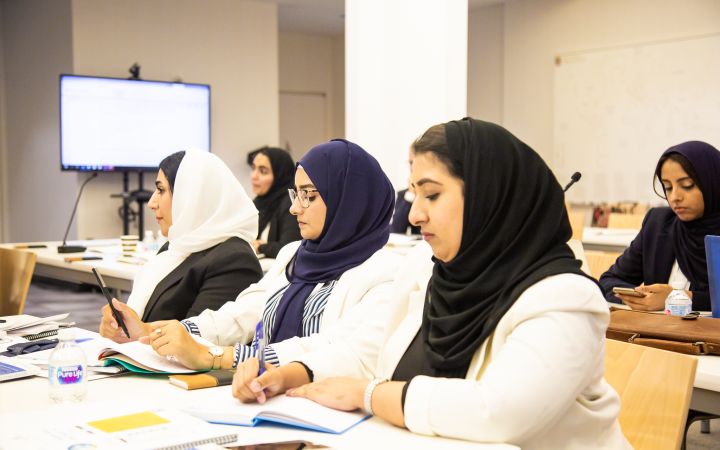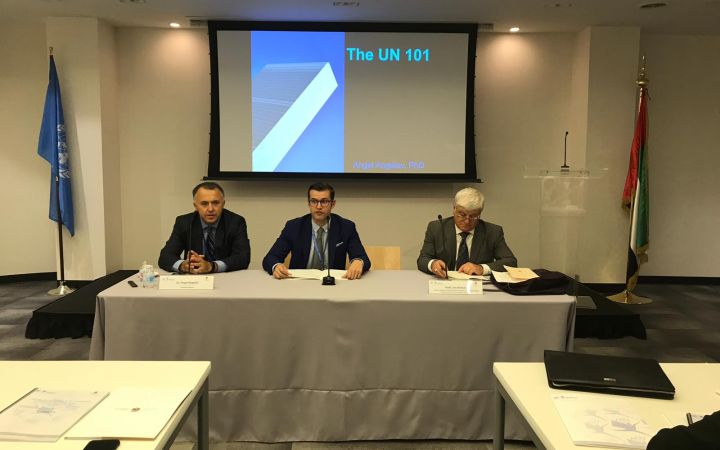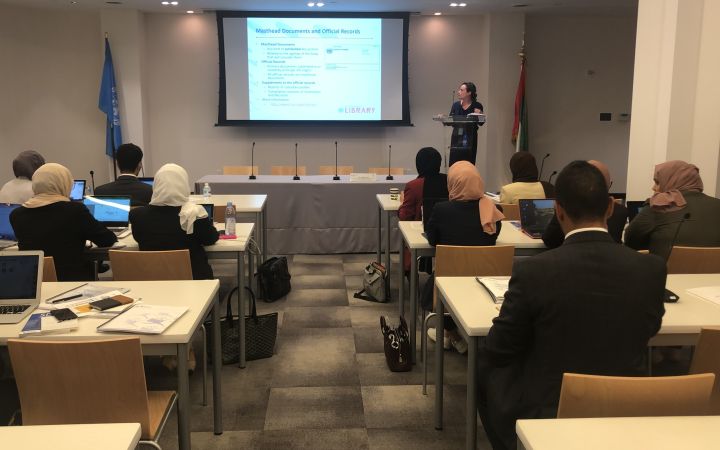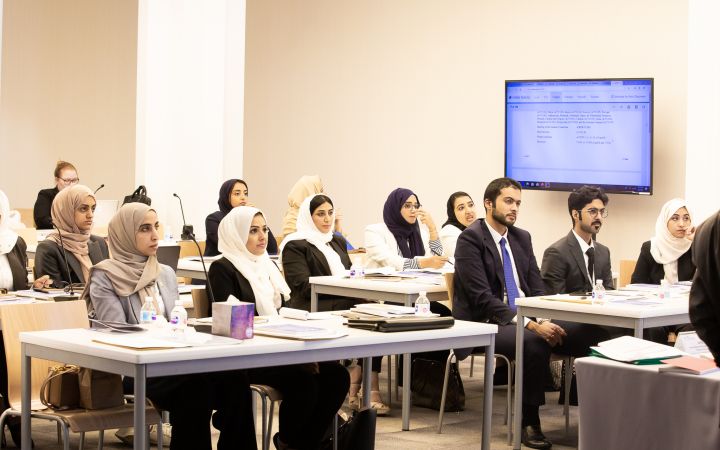5 September 2019 New York, USA – The United Nations Institute for Research and Training (UNITAR) New York Office has launched a training course for delegates of the United Arab Emirates (UAE) Mission to the United Nations entitled, “Core Diplomatic Training for United Arab Emirates Diplomatic Corps.” The course, which will take place over seven days, was launched on 3 September 2019. The course opened with welcome remarks delivered by Amb. Mr. Ion Botnaru, former Director of the General Assembly and ECOSOC Affairs Division of the United Nations Secretariat, Dr. Angel Angelov, UNITAR facilitator, and Mr. Pelayo Alvarez, Programme Coordinator for UNITAR. Thus far, delegates have been introduced to the structure and organization of the United Nations, Responsibility to Protect, Report Writing and UN Library resources.
The first day of the course was divided into two sessions and offered the delegates an explanation of the United Nations structure and organization. Dr. Angelov, UNITAR facilitator, led the morning session, introducing participants to the main players at the UN by defining their role in both the UN system and in the General Assembly. Regional and political groups were outlined by their respective member states, as Dr. Angelov described the different roles each of them play within the UN system. UAE Delegates received a thorough breakdown of the principle organs of the UN, including the General Assembly, Security Council, ECOSOC and the Secretariat. Dr. Angel Angelov shared his personal experiences as a reference to understanding the role of a diplomat at the UN, discussing the issues he worked on under the Security Council. The afternoon session was introduced by Mr. Marco Suazo, Head of UNITAR New York Office. Amb. Mr. Ion Botnaru led a session on the rules and procedures of the General Assembly, providing participants with a handbook to use as a practical guide to the UNGA. Amb. Mr. Botnaru provided valuable information on how to navigate the UN Journal and the resources that are available there. Participants left the session with a better understanding of the UN Charter, the General Assembly Handbook and the Rules and Procedures of the General Assembly.
The second day, Ms. Susan Goard, Law Librarian and Training Coordinator of the Dag Hammarskjold Library at the United Nations Headquarters, provided a tutorial of the Official Documentation System and UN Library Resources. Ms. Goard gave an interactive presentation on how to navigate UN resources and the UN library website. Participants learned how to retrieve resolutions in ODS, voting records, meeting records, and previous statements. UAE Delegates were given tasks to complete on their personal computers to ensure understanding of how to navigate the library website efficiently. In the afternoon, Amb. Mr. Ion Botnaru returned to provide training on the outcomes of High-Level meetings and conferences, resolutions and report writing.[BB1] Amb. Mr. Botnaru outlined the duties of both the Secretary General and the President of the General Assembly during the afternoon session. Hand-outs were provided to participants, showing how effective reports pertaining to the General Assembly are written, including the structure and style that should be used.
The third day was led by Ms. Jelena Pia-Comella, Former Deputy Executive Director, WFM-IGP, International Coalition for the Responsibility to Protect, Former DRP Andorra; and Mr. Sandy Singer, Lecturer/Instructor in the UN-LCP English Language Programme, and Consultant/Professor in the field of Written and Oral Communication for Business. Ms. Pia-Comella led the morning session on the origins, functions and implementation of Responsibility to Protect (R2P). She shared with participants her own experience as the Former DRP to Andorra, and how she witnessed the creation of R2P as a result of the genocides committed during the 1990’s in the Balkans and Rwanda. Ms. Pia-Comella walked participants through the founding documents of R2P, and the evolving plan for its implementation by the Secretary General. She spoke candidly with participants about the challenges of implementing a norm such as R2P, as opposed to a treaty. Ms. Pia-Comella discussed the role of UN Peacekeepers in upholding R2P, and gave relevant regional examples of how R2P principles were effectively applied, specifically in Libya. Delegates asked engaging questions about the limitations of R2P, and how member states can best uphold R2P when non-state actors are involved in conflict. The afternoon session was led by Mr. Sandy Singer, who provided an interactive presentation on how to apply principles of good writing and the purposes of UN writing. Throughout the presentation, Mr. Singer provided delegates with writing exercises and tools to use while writing in a professional capacity. Topics Mr. Singer covered with participants included how to be concise, direct and use action-oriented language. Throughout the session, delegates asked engaging questions about how to write for specific audiences, and the type of language that is most effective in a UN setting. To close the session, participants received a handbook from Mr. Singer that included writing tips, resources and key phrases that will further the delegates writing skills.





